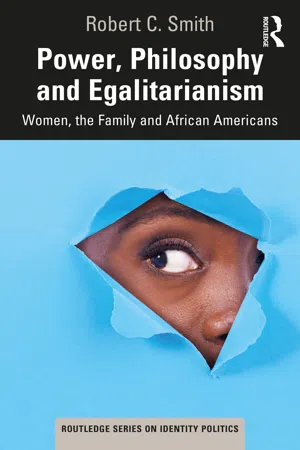The sexual and racial contracts have been intimately connected since modern States (civil society) began to be created in the seventeenth century and the three dimensions of the original contract—social, sexual and racial—have cut across and reinforced each other. The state has upheld laws and policies that have consolidated structures of racial and sexual power, the sexual contract has been refracted through race, and the racial contract has shaped sexual relations, and both contracts have structured citizenship.10
Any attempt to analogize black oppression with the plight of the American white woman has the validity of comparing the neck of a hanging man with the hands of a mountain climber with rope burns… . The depth, extent and importance—indeed the suffering and depravity of the real oppression blacks have experienced—can only be minimized in an alliance with white women who have heretofore suffered little more than boredom, genteel repression and dishpan hands.11
Second, women, both black and white, have tended to show more solidarity with their race than their sex. As Dubois wrote of white women: “The Negro race has suffered more from the antipathy and narrowness of women both North and South than from any other single source.”12 Third, the ideology of white supremacy and black inferiorization is more deeply rooted, tenacious and widespread in both elite and popular culture in the US than the ideology of male supremacy and female inferiorization. This means, as I conclude in this book, that gender equality is likely to be achieved before—perhaps long before—racial equality. Nevertheless, while gender equality is not a prerequisite to race equality, it is likely it will facilitate equality for the blacks by partially liberating more than half the people.
The primary focus of this book is on gender and racial equality in the society and polity. But it also has the family as focus because it is possible that gender equality cannot be achieved in society until there is egalitarianism in the family, more specifically in marital politics or the power relationships between intimate partners.
The family and the state are two of the most important and powerful institutions of any society. Many classical theorists view the family and the state as historically connected. That is, they think states evolved out of families and that families are the essential building blocks of modern societies and states. Aristotle in his Politics said the family was the primary unit of society, out which evolved villages and then states.13 Hobbes referred to families as “little kingdoms”, “little cities”, as “leviathans writ small”.14 Like Aristotle, he too believed that states developed initially out of families. Locke writes, “The first society was between man and wife, which gave beginning to that between parent and children.”15 And for Rousseau, “The oldest of societies, and the only society that is in any sense natural is the family … the earliest model of political societies.”16
Hobbes, Locke and Rousseau for somewhat different reasons argue that men as husbands should exercise power or dominance in the family. Marxism views this male dominance as the beginning of oppression and exploitation in society. Engels describes the family as the “cellular form of civilized society”, and pointing toward Marxism’s radical egalitarianism compared with liberalism Engels writes, “The first class opposition that appears in history coincides with the development of the antagonism between man and woman in monogamous marriage, and the first class oppression coincides with that of the female by the male.”17 Chapter 3 is devoted to comparison of liberal and Marxist views on the origins of the family, and the role of sexism and patriarchy in each tradition.
This is fundamentally a book about power, the power exercised by white men to subordinate women and blacks. Politics may be defined in a variety of ways—the allocation of values and resources, the pursuit of one’s interest, the creation of the good and just society, authoritative decision making, the regulation of conflict or the manipulation of others to achieve one’s purposes-however; all of th...
